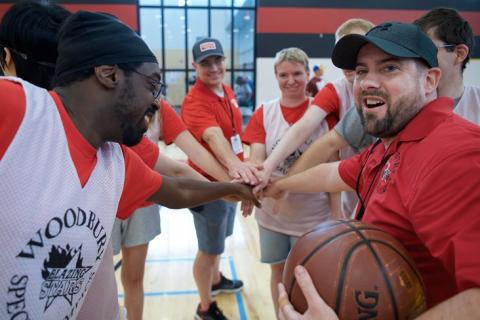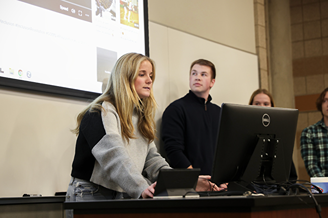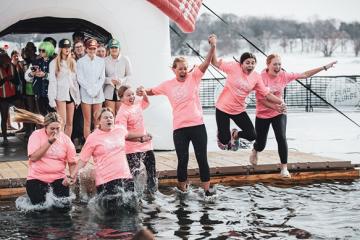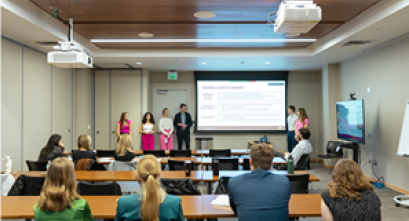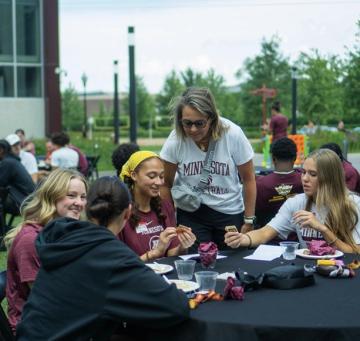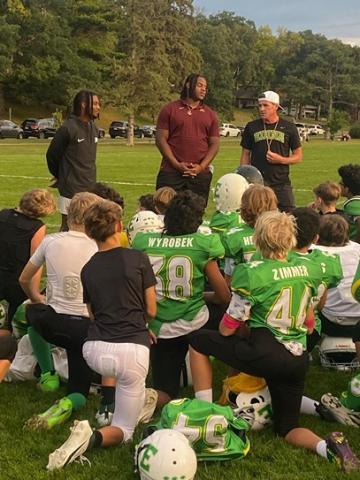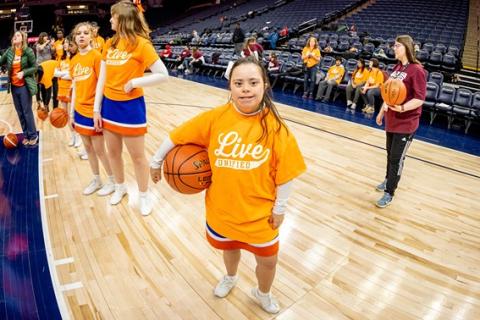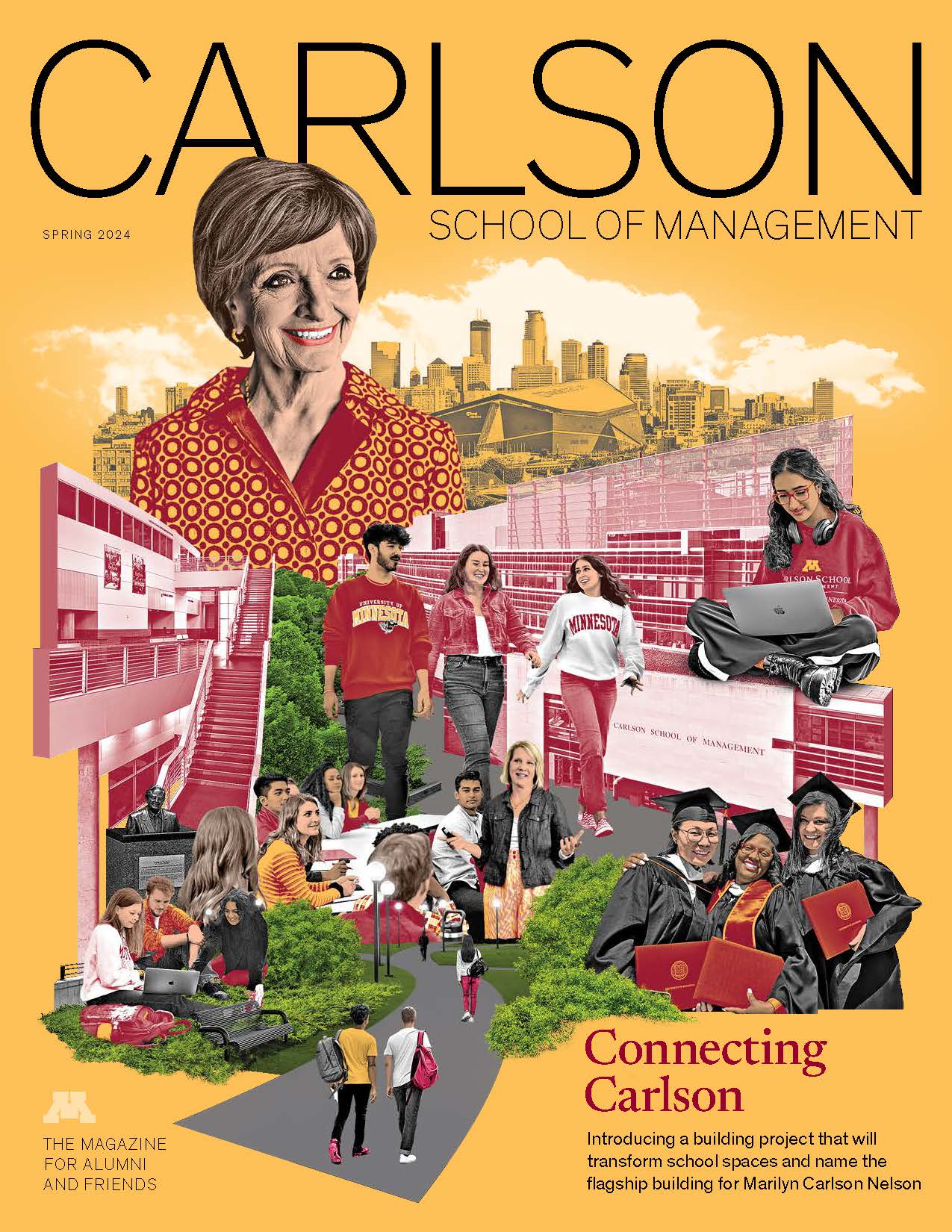
Undergrad Experiential Learning Empowers Community
Friday, April 5, 2024
By Rose Semenov
How new experiential learning opportunities enhance the undergraduate experience and empower local organizations.
Sticky notes fill the whiteboard. Voices across the room overlap. One student types furiously into a laptop while another refers to a spreadsheet. Questions hang in the air. The project deadline is just weeks away. This is the “messy middle” of the Carlson Impact Lab, where more than just a passing grade is at stake. The students are working with Special Olympics Minnesota to identify ways to increase engagement ahead of the 2026 Special Olympics USA Games, which will be hosted at the University of Minnesota. With the national spotlight, the organization wants to supercharge the movement of inclusion statewide, leaving a legacy beyond the Games.
“There’s an actual purpose on what we’re researching and doing, so it definitely created motivation and drive to do our best,” says Rachel Secrist, a sophomore in the Undergraduate Program.
Learning With Purpose
This year marks the first cohort of students enrolling in the Impact Lab, a required, two-course experience that’s part of the school’s award-winning undergraduate curriculum. In year one, students learn how to problem-solve. In year two, they apply these lessons via Impact Lab in Action. Throughout the semester, students work with an organization to assess a business problem, provide recommendations, and create implementable deliverables.
Amee McDonald, the Impact Lab’s managing director, says the goal is to empower students early in their undergraduate careers with more experiential learning opportunities to grow and learn.
“This is a space where we’re giving them the boundaries and then they have to take the initiative to really make this experience what it’s supposed to be for their learning,” explains McDonald. “And then if they experience that failure, this is a safe space to fail.”
Throughout the semester, student teams work closely with their instructors and mentors to explore possible solutions for their client. In Special Olympics Minnesota’s case, the organization is on a campaign to attract the next generation of volunteer coaches, targeting young adults and tapping into networks beyond athletes’ family members.
Trenton Knutson, a sophomore in the Undergraduate Program, says his group focused on improving Special Olympics Minnesota’s TikTok strategy to better connect with young adults. After analyzing the historical volunteer data, they outlined several strategies, such as developing videos that highlight powerful volunteer experiences and capitalizing on social media trends, to create more engaging content.
“If we can make something Special Olympics could easily replicate and get consistency with, that would be best for them,” explains Knutson. “So we presented them a plan that they could reuse and that was reliable. They ended up really loving it, saying that they wanted to implement it right away.”
Other teams looked at building long-term partnerships with National Honor Societies across the state to build volunteer pipelines, tapping into young adult sports leagues, and enhancing recruitment strategies on the University’s Twin Cities campus, home to nearly 55,000 students.
Dave Dorn, the president and CEO of Special Olympics Minnesota, applauded the thoroughness of the students’ insights, which he says the organization plans to incorporate when building its strategic plan for the Games.
“It’s good to get young people’s perspective on issues that you’re tackling,” says Dorn. “It does open your eyes to questions you should consider, especially when these are the people that we want to take the movement to that next level.”
We presented them a plan that they could reuse and that was reliable. They ended up really loving it.
Leading Through Ambiguity
After completing the Impact Lab, undergraduates can expand their résumé with additional experiential learning opportunities by applying to the Leadership Lab. The Leadership Lab provides Carlson School undergraduate leaders a community to work together on real-world problems while continuing to hone their leadership and teamwork skills. Students accepted to the program can earn up to a $3,500 stipend, thanks to generous financial support. With cohorts consisting of high achievers, the biggest challenge may be learning leadership isn’t as straightforward as it seems.
“You’re bringing in people who are often seen as leaders in past projects in other classes to work together. So how do you navigate roles and responsibilities,” asks Sarah Wojnicki Smith, the Leadership Lab program director. “How do they navigate those teamwork dynamics while working on ambiguous problems? And because they are working with a community client, they need to navigate external relationships, too. Students have had really interesting and challenging experiences when they are put into a position they aren’t normally put into.”
The data they got is just gold because as a startup we couldn’t have done that ourselves.
Last semester, students partnered with Dinkytown Athletes. The new collective serves as the resource for Gophers student-athletes as they navigate opportunities to monetize their name, image, and likeness (NIL) under the new NCAA rules. Derek Burns, ’00 BSB, and former Gophers football player, co-founded the startup as a way to help give back to the community that once supported him.
“The generational difference is when I was a student-athlete, my coaches helped me get part-time jobs in the summer or off-season,” says Burns. “NIL is the new version of that because now with their schedules, they can’t have a part-time job. They just don’t have the time. So for them to be able to do some promotional and mainly social media work and get paid for it is their part-time job.”
With the NIL industry being so new, the Leadership Lab students were initially unsure which direction to take.
“There was a lot of ambiguity that we had to sift through to figure out what we were really trying to focus on and what we were trying to learn,” says Brenna McClarey, a senior in the Undergraduate Program.
After navigating through this “messy middle,” the team decided to conduct a survey to identify a target audience for NIL promotions and also complete outreach to determine which Twin Cities businesses were interested in working with Dinkytown Athletes to create NIL partnerships with student-athletes.
“The data they got is just gold because as a startup we couldn’t have done that ourselves,” says Burns. “We would’ve had to go to a market research agency to just even get that information. So that was huge. We almost have a blueprint now on what we can take on and where to efficiently use our time and resources to grow.”
Jenna Vilter, a junior in the Undergraduate Program, says her experience in the Leadership Lab cemented her decision to pursue business.
“It’s so hands-on, you feel like you are part of the progress that the companies are making and I never would have expected to be doing that before I got my degree,” says Vilter. “It’s supercool as a junior in college to be able to say that.”
‘A Beautiful Collaboration’
As more students complete the Impact Lab, the enhanced hands-on learning opportunities will enrich the academic experience at the Carlson School.
“It’s this beautiful collaboration of how we are teaching students these problem-solving skills early in their career so that they’re using them not only in the Impact Lab or Leadership Lab, but throughout their classes in the curriculum,” says Wojnicki Smith. “I think we’re going to see a really big change in how students are approaching problems in all of our classes and beyond.”
Secrist, who worked on the Special Olympics Minnesota project, says she’s already applying her Impact Lab skills to her next career steps.
“I’ve had a few internship interviews and I’ve been able to talk about this class on how I’m meeting with real people. I’m working with others, I’m able to lead and it’s a huge quality that a lot of companies like to hear,” she says.
It’s an experience students are hungry for.
“The best experience is real-world experience,” says Knutson. “Getting into the nitty-gritty of it. Because when you work with real people, it has real impact, and you do feel that.”
